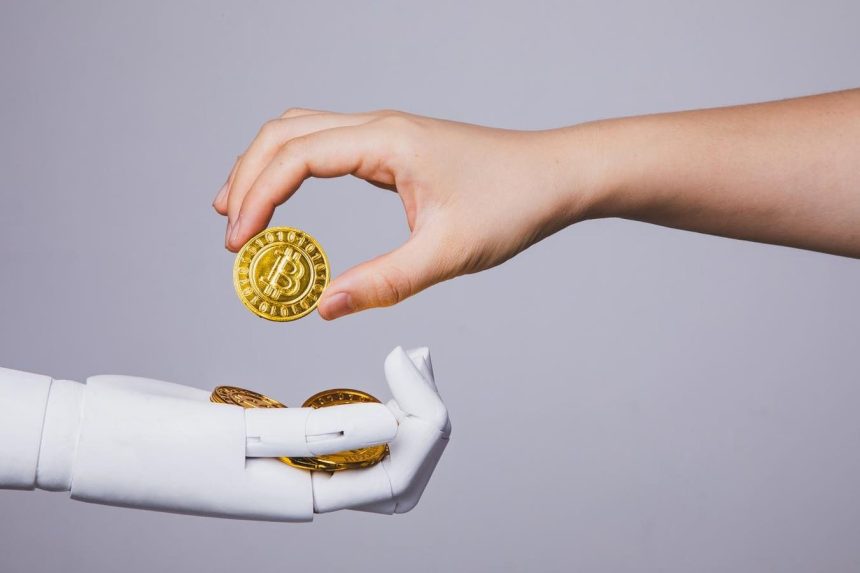The intersection of artificial intelligence (AI) and cryptocurrency presents a paradigm shift in the digital economy, promising both exciting opportunities and significant risks. AI-powered crypto projects, ranging from AI oracles performing live Bitcoin mining to decentralized AI marketplaces, offer the potential for increased speed, automation, and innovation in financial services. However, the lack of regulatory clarity and the inherent complexities of these technologies raise crucial questions about fairness, oversight, and security. Will these innovations democratize access to financial tools or exacerbate existing inequalities? Will they empower individuals or concentrate power in the hands of a tech-savvy elite? These are the fundamental questions that must be addressed as we navigate this rapidly evolving landscape.
AI’s integration into the crypto sphere manifests in various forms. AI algorithms are being deployed to optimize blockchain operations, enhancing efficiency and security through improved fraud detection and predictive analytics. Decentralized AI marketplaces, powered by crypto tokens, are emerging as platforms for developers to create, share, and monetize AI services without centralized control. Furthermore, AI-driven autonomous agents are being designed to execute smart contracts, trade assets, and automate decision-making in decentralized finance (DeFi) protocols. These advancements promise to revolutionize financial interactions, but the underlying challenges of transparency and accountability remain. Without adequate safeguards, these technologies could replicate and amplify the problems of Web 2.0, such as hyper-centralization, privacy violations, and data security breaches.
While centralized AI models dominate the current landscape, decentralized AI (deAI) offers an alternative approach. By leveraging blockchain or peer-to-peer networks, deAI aims to distribute the development, governance, and access to AI resources. This decentralized approach promises increased transparency and enhanced data privacy. However, critical questions persist regarding the potential for token-based governance to recreate existing power imbalances. Furthermore, the lack of clear lines of accountability in decentralized systems raises concerns about redress when errors occur. The parallel evolution of AI and crypto necessitates careful consideration of these issues to ensure a future that benefits all stakeholders.
Several key challenges require immediate attention from policymakers, market participants, and the tech industry. The ethical implications of AI in crypto are paramount. AI algorithms are susceptible to biases present in the training data and the motivations of their developers. In the fast-paced, financially driven crypto world, ethical considerations often take a backseat. Therefore, mechanisms must be established to prevent AI-driven blockchain systems from perpetuating existing biases, excluding marginalized communities, or widening financial disparities. Auditing and public oversight of AI algorithms used in DeFi lending and credit scoring are crucial steps towards ensuring fairness and accountability.
Another critical concern is the potential disconnect between the complexity of AI-driven crypto projects and the accessibility for average users. While decentralized AI promises to democratize access to sophisticated machine learning tools, the technical intricacies of these systems could create a barrier to entry for many. Without comprehensive educational initiatives, the benefits of this technology may be limited to institutional investors and tech elites, further exacerbating the digital divide. Therefore, ensuring that retail investors and their advisors are adequately informed about the risks associated with AI-driven decision-making in crypto is essential.
Data privacy and security also emerge as significant concerns. While blockchain technology is often touted for its enhanced security features, the integration of AI introduces new vulnerabilities. AI models require vast amounts of data, raising concerns about the potential for unauthorized collection and monetization of user information. Protecting user data and ensuring compliance with existing data privacy regulations like GDPR and CCPA are vital considerations. Effective safeguards must be implemented to prevent AI-crypto platforms from exploiting user data without consent.
The convergence of AI and crypto presents a double-edged sword for investors, innovators, and consumers. On one hand, it holds the potential to revolutionize finance, empowering retail investors, fostering innovation, and enhancing security. On the other hand, without proper oversight and safeguards, these advancements could create significant risks, potentially outweighing the benefits. The challenge lies in striking a balance that encourages innovation while protecting market participants. Policymakers, regulators, and industry leaders must collaborate to ensure that these technologies are leveraged to promote financial inclusion and economic opportunity, rather than exacerbating existing inequalities and systemic risks.
Congress has a crucial role to play in shaping the future of AI and crypto. Reactive enforcement is insufficient; clear, forward-thinking legislation is necessary to address the unique challenges posed by these technologies. Several key policy questions require immediate attention. Should AI-powered blockchain projects be subject to existing securities laws, or is a new regulatory framework required? How can financial regulators effectively oversee AI-driven trading and lending algorithms to mitigate systemic risks? Should Congress mandate transparency and ethical auditing standards for blockchain-based AI models? These are crucial questions that must be addressed to create a regulatory environment that fosters innovation while protecting consumers and maintaining market stability. The crossroads of AI and crypto demands proactive and informed decisions to ensure that this technological transformation leads to a more inclusive and stable financial system.



